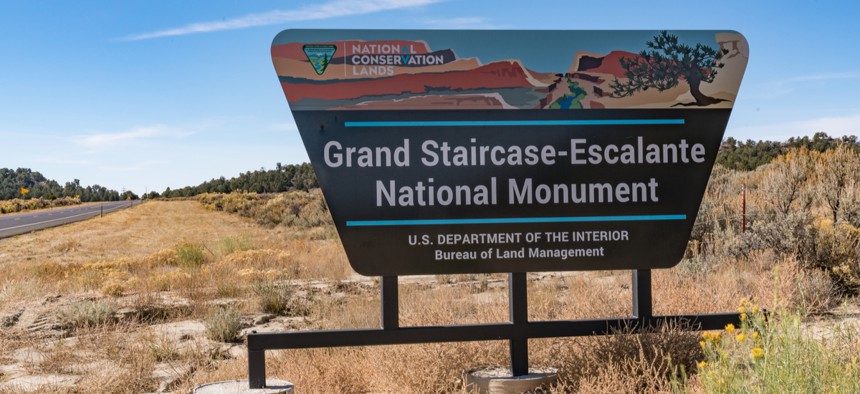Senators Look at Policing Practices by Federal Land Management Agencies

Grand Staircase-Escalante National Monument in southern Utah Shutterstock
“This issue is of great concern to communities throughout the West,” said Utah Sen. Mike Lee. “Increasingly, these communities find themselves as targets of overly zealous federal law-enforcement operations.”
WASHINGTON — The question of whether federal land management agencies should be stripped of their law enforcement powers requires “ongoing discussion,” a Utah Republican said Wednesday at an oversight hearing of the Senate Subcommittee on Public Lands, Forests, and Mining.
“We all seem to agree there should be more local law enforcement involvement in this area,” Sen. Mike Lee said at the conclusion of the hearing. “The question that remains, as I see it, is whether law enforcement authority for federal land management agencies are, by their nature, so wrongly placed or at least situated in such a way that they are so prone to abuse that Congress should consider amending or perhaps revoking their authority.”
The hearing stemmed largely from a 2009 federal undercover operation in Blanding, Utah, that targeted private collectors of Native American artifacts. More than 100 agents with the FBI and the Bureau of Land Management, or BLM, fanned out across the region, knocking on doors and eventually charging two dozen people after nearly two and a half years of investigation, according to The Washington Post.
Defendants were charged with violating the federal Archaeological Resources Protection Act and the Native American Graves Protection and Repatriation Act.
Native American groups considered the raid a success and the first step in a long-needed crackdown on the removal of precious artifacts from their resting grounds. But others saw the raid--conducted in the early morning hours by agents wearing flak jackets, sometimes with snipers perched on nearby rooftops—as an egregious example of federal overreach.
The day after the raid, James Redd, a Blanding doctor implicated in the raid along with his wife, committed suicide. Two other people connected to the sting committed suicide within the next year. Redd’s family filed a wrongful death suit against the agencies, and Sen. Orrin Hatch, a Republican from Utah, blamed the suicide on “the unnecessary and brutal actions by federal agents.”
The sting operation ultimately yielded little in terms of punishment. Charges were dropped against six defendants; 11 pleaded guilty to felonies, eight pleaded guilty to misdemeanors. No one arrested in connection with the sting served prison time, the Post reported.
The echoes of the furor were present at Wednesday’s hearing, where Lee questioned whether federal land management agencies—including the Bureau of Land Management and the U.S. Forest Service—could responsibly execute their law-enforcement authorities, or whether those powers should instead be delegated or returned to local agencies.
“This issue is of great concern to communities throughout the West,” Lee said. “Increasingly, these communities find themselves as targets of overly zealous federal law-enforcement operations.”
The land management agencies, Lee said, were originally intended to sustain the growth, health and diversity of federal lands, not to conduct “year-long cloak-and-dagger missions.”
“I fear that the Bureau of Land Management and the Forest Service have expanded their mission beyond this,” he said.
Much of the tension between local communities and federal agencies could be solved by allowing local law enforcement offices to handle policing on federal lands, said Utah State Rep. Mike Noel, who represents an expansive legislative district in the southern part of the state.
Local officers have ongoing relationships with the people they police and could more deftly handle tense situations, he said. It could also save money, as police officers and sheriffs’ deputies command lower salaries than their federal counterparts.
“Having law enforcement be the local law enforcement is what my testimony is about today. It’s imperative, it’s important, it’s critical that we go back to the concept of the county sheriff,” he said.
The 2009 raid, he added, “should never have happened. And it would not have happened under traditional law enforcement.”
Brian Steed, the deputy director of policy and programs at BLM, said the agency is reviewing its policies and tactics in the wake of the 2009 raid. That includes reexamining whether agents need to wear flak jackets and conducting thorough reviews of both policies and personnel to weed out any “bad actors.”
“We are absolutely trying to increase our accountability to the American people by having the right personnel at the helm,” he said. “We’re absolutely trying to change policy to make sure we’re as accountable and responsive and as good at our job as possible.”
To that end, Steed noted, federal land management agencies already contract with local law enforcement on a number of things. Changing or increasing that partnership could require that local agents go through a federal training program, but Steed said he would be open to discussing it.
“The default position should always be to incorporate local law enforcement,” he said. “If you were to look at our cases writ large…there are many, many cases where that type of relationship plays out on a daily basis. What we’re doing here is trying to work very closely with our state and local partners and meet the needs we face in managing public lands.”
Kate Elizabeth Queram is a Staff Correspondent for Government Executive’s Route Fifty and is based in Washington, D.C.
NEXT STORY: This Alabama Town Reimagined Its Vacant Kmart





